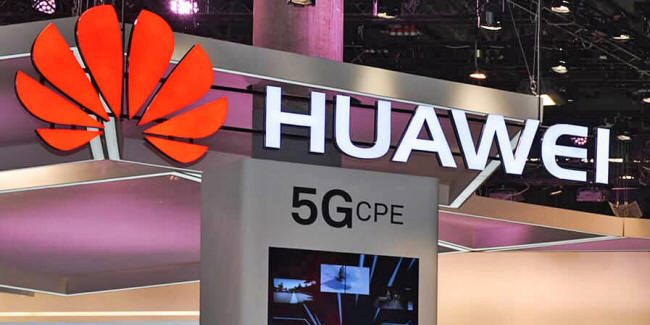|

by Tyler Durden
August 23,
2018
from
ZeroHedge Website

Since Huawei and the Chinese Technocracy are
closely aligned, Australia has finally figured
out that if allowed to participate in their 5G
rollout, Huawei would be a direct conduit for
espionage.
China openly seeks to be the global
leader in 5G technology.
Huawei has long been suspected of spying for the
government.
Source
China Furious
After Australia Bans Huawei From Mobile Network Project
Taking a page out of Trump's playbook - and coming at a tumultuous
time for the country, with PM
Malcolm Turnbull apparently on his way out and
the
local government in disarray -
Australia banned Chinese telecom giant Huawei Technologies from
supplying equipment for a
5G mobile network, citing risks of
foreign interference and hacking which Beijing angrily dismissed as
an "excuse" to tilt the playing field against a Chinese firm.
The decision aligns Australia with the United States, which
previously restricted
Huawei and compatriot
ZTE Corp from its own
market for similar "security" reasons.
The surprising move - which has already antagonized Australia's
biggest trading partner - follows advice from security agencies, and
signals a hardening of Australia's stance toward its biggest export
market as relations have soured over Canberra's allegations of
Chinese meddling in Australian politics.
In a statement on Thursday, the government said that national
security regulations typically applied to telecom carriers would now
be extended to equipment suppliers:
"firms who are likely
to be subject to extrajudicial directions from a foreign
government" would leave the nation's network vulnerable to
unauthorized access or interference, and presented a security
risk, the statement said according to Reuters.
Chinese law requires
organizations and citizens to support, assist and cooperate with
intelligence work, which analysts say can make Huawei's equipment a
conduit for espionage.
"That's what you get
when you have the aligned strategy of a Chinese company with the
Chinese government," said John Watters, Executive Vice President
and Chief Corporate Strategy Officer of cybersecurity firm
FireEye Inc.
"(Australia) basically made a decision to spend more money to
have more control over their national communication system,
because they're up against a competitor that will sacrifice
near-term margin for long-term intelligence advantage," he said.
While Australia did not
identify the Chinese firm, an Australian government official said
the order was aimed at Huawei and blocked its involvement in the
network.
On Twitter, Huawei's Australian arm, which has denied it is
controlled by Beijing, said on Thursday that the action was an,
"extremely
disappointing result for consumers".
China, predictably, was
furious with the announcement coming just months after the US
engaged in a similar ban for security grounds.
In Beijing, foreign
ministry spokesman Lu Kang said China expressed "serious
concern", adding that Australia should not,
"use various excuses
to artificially erect barriers and conduct discriminatory
practices".
China also called the
Australian decision wrong and said it should,
"not interfere" nor
"restrict Chinese businesses from operating normally" for
security purposes, an exclusion which apparently is only
permitted for China.
-
CHINA COMMERCE MINISTRY SAYS AUSTRALIA SHOULD NOT INTERFERE AND
RESTRICT CHINESE BUSINESSES FROM OPERATING NORMALLY BASED ON THE
GROUNDS OF NATIONAL SECURITY
-
CHINA SAYS AUSTRALIAN GOVT.'S 5G DECISION IS
'WRONG'
"We urge the Australian government to abandon ideological prejudices
and provide a fair competitive environment for Chinese companies'
operations in Australia," Lu said during the news briefing.
As Reuters notes, Australia had previously banned Huawei, the
world's largest maker of telecommunications network gear, from
providing equipment for its fiber-optic network and moved to block
it from laying submarine cables in the Pacific.
However, the latest Huawei exclusion from the mobile network comes at a time of
particularly strained relations between Australia and China, which
Prime Minister Malcolm Turnbull had two weeks ago sought to reset
with a conciliatory speech.
"It is... out of step with this attempt to reset the relationship,"
said James Leibold, Associate Professor of Politics and Asian
Studies at La Trobe University.
"They're not going to forget Turnbull's earlier strident language
anytime soon," he said.
The good news for China:
Turnbull's tenure as prime minister is
doomed as his ruling party struggled with an internal leadership
battle which saw ministers desert Turnbull and call for a leadership
vote.
The bad news:
Turnbull will most likely be replaced with
right-wing populist Peter Dutton, who this week carried out a burst
of TV and radio interviews to outline a populist policy manifesto,
including removing a tax on electricity bills for families and
pensioners, a wide-ranging investigation into energy companies
blamed for spiraling prices, and cuts to immigration.
And since it is unlikely that
Peter Dutton will be any more hospitable to
China's "intelligence" overtures than his predecessor, the most
likely outcome is that yet another spoke of global trade - that
between China and Australia - is about to be engulfed by flames as
yet another
G-10 nation turns populist and
protectionist...
|


